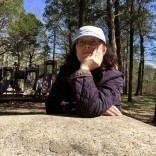The Ice Cream Brotherhood
Nicholas A. White
I saved Westwood Avenue for last, knowing Jeremy’s goodbye was going to be the hardest. Over the years I’d come to know most of the kids along my route, and none better than him.
“So you’re quitting?” Jeremy said, crossing his arms.
“No, I’m not quitting. But you’re going to have a new ice cream man.”
“But I don’t want a new ice cream man. Why can’t you keep coming here?”
I didn’t tell him Roger had sold our small company amid growing gas prices. For the past six years, Roger had bought the ice cream in bulk and set the prices for us to sell, and we had operated as his employees, with a base salary and a commission on what we sold. This new arrangement wasn’t supposed to change with East Coast Driving taking over, but for something without any change, there seemed to be a lot of it. For example, I would no longer be allowed to have the name Jared’s Gelato on the truck, with an emphasis on the truck, because East Coast Driving had made a point of saying it belonged to the company, not me. I would also need to get the East Coast logo painted on over the weekend, before supposedly starting my new route, neither of which I wanted to do.
“My boss has a new boss,” I said. “And that guy’s all the way up in Boston, and he’s going to track our trucks with these little GPS computers so they’ll know where I am. And if I keep coming here, I might get in trouble.”
“Why?” Jeremy asked.
“Because we’ve been assigned new routes in order to maximize gas efficiency.” This explanation came from Roger’s direct boss in Boston.
“I don’t get it,” Jeremy said. “That’s stupid.”
I didn’t know what to make of the word stupid. Jeremy had confessed to me the previous summer that other kids on the playground liked to corner him by the slides and call him words like fat and stupid, and I’d assumed he would grow to avoid the word, like I’d grown to avoid nerd. But without kids of my own, I only saw glimpses of childhood from other people’s kids, and I didn’t know the intricacies of word choice and what they might mean.
“Stupid isn’t a nice word, Jeremy,” I said.
He crossed his arms again, refusing to take the Éclair he’d already paid for.
I glanced at his house. Over the past summer, I’d pieced together Jeremy’s relationship with his mom. But what could I do, with open-handed slaps still being legal? Apparently, it remained acceptable to think at-home discipline required physical pain—as if the best way to form a child was to stuff him into a tight container like a piece of play dough and use our palms to smack and smack until all of him fit in there, until we could smash the lid on top and say, Look! I’m finished! I’ve just raised a disciplined child!
“Why can’t you talk to the Ice Cream Brotherhood?” Jeremy asked. “They’ll let you keep coming here, I know it.”
“Those are just stories, Jeremy. They’re not real.”
“But you said they’re real.”
“I said we can make them seem real.” I checked the clock and imagined Roger’s boss in Boston, watching the dot of my truck on his map with a stopwatch, waiting for me to break his time threshold so he could call Roger and complain about my stopping in one place for too long.
“But you said the Brotherhood was a secret organization. And you said you were initiated. And you said, you said—”
The Ice Cream Brotherhood had started as a joke, after a new driver sold ice cream on my route, and I threatened to break his windshield with a baseball bat—which got him to laugh, since I’ve always been the type of guy whose threats aren’t typically serious. That night, though, I carved a secret logo into a baseball bat beside a bonfire. On the bottom of the wooden handle, there’s an ice cream cone with the earth scooped on top and the name, Jared’s Gelato, carved underneath. I started carrying the bat around with me in my truck, claiming it was the symbol of a secret society devoted to the purification of the industry against corrupt behavior, like selling drugs from the truck—though for the kids I didn’t mention anything about drugs, of course. I just told them the Brotherhood’s a group that protects people who get bullied.
I didn’t know how to say goodbye to Jeremy. His stomach protruded under his tight T-shirt, as if he’d put on ten pounds by ingesting the pain of having to silently say goodbye to another man who was old enough to be his father.
“I’m sorry, buddy,” I said, checking the clock. “How are things at home?”
Jeremy wouldn’t look at me.
My first year on the job, I’d called social services for a similar situation with a different child, and though they didn’t give me any details of what happened after, based on the conversation, I doubted they even launched an investigation.
“Come on,” I said. “Let’s go talk to your mom.”
“I don’t think we should do that.”
“Trust me on this one,” I said.
~
In Roger’s defense, he fought for us to keep our same routes. “Jared’s been doing this for six years now,” he’d said. “And for half that time he’s been driving under Jared’s Gelato. The kids recognize him. They know him. He’s got brand recognition.” But Roger’s boss in Boston, on the other hand, didn’t think the driver was important to the amount of ice cream sold, and so we were going to lose our routes, and I was going to lose my personalized logo, and I’d already decided that after I said goodbye to my kids today, I was going to look for a new job. Corporate politics made me want to explode. I’d originally started selling ice cream for the absence of politics in the industry, but all of that was changing.
Jeremy’s mom was more put-together than I remembered, and she easily played the innocent card, pretending her son never walked around with red splotches on his cheeks.
“Jeremy, come stand over here,” she said. “You know better than to bring strangers to the door.”
“But he’s not a stranger.”
“Jeremy! Come stand over here.”
She looked like she wanted to call the cops on me, her expression a combination of disgust and fear, as if she considered me a pedophile for holding hands with her son at their doorstep, even though I’d known him for two years.
“Now go to your room,” she said.
“But I don’t want—”
“I said go to your room!”
Jeremy looked like he might cry, and quickly I realized I wasn’t going to make a grown woman rethink her parenting strategy in a matter of minutes. I thought about the baseball bat in my truck, the one with the Ice Cream Brotherhood engraved on the handle.
“Hold on,” I said. “Just hold on for a second, okay?”
I ran to my truck for the baseball bat. I wasn’t gone longer than a minute, but the door was already shut when I came back. I heard Jeremy sobbing from inside, and his mom’s voice rising like a whip, and then a smack, and another. My heart sank. I rang the doorbell a half-dozen times, not caring if Jeremy’s mom called 911 on me—I was a grown man and could take it, but Jeremy wasn’t, and he needed to know the world wasn’t full of adults who failed to understand the line between discipline and abuse.
The door flung open. “Don’t think I won’t call the cops—”
She shrank back when she saw the baseball bat.
Behind her, Jeremy stepped quietly into view, tears still wet on his flushed cheeks. I winked at him, hoping to give him courage. Reluctantly he winked back, seeming to know what I meant about the Brotherhood always being there for him, even if it didn’t technically exist.
It’ll be okay, I wanted to say.
“We’re always around, you remember that,” I said.
“What are you talking about?” his mom asked. Her voice lacked the same anger, though. She knew I’d heard the smacks, and this seemed to have changed the dynamic between us. She tried putting on a more publicly innocent face again, the one from earlier.
“Me and the other drivers—we’re called a brotherhood for a reason.”
“Are you threatening me?”
“No, of course not,” I said. “I’m just letting you know that we’re always around.”
I leaned the bat against the porch, knowing what needed to happen next: walk down the stairs before I got arrested. Jeremy’s mom started to close the door, but Jeremy slipped around her and followed me to the top of the stairs, where he stopped with a small jump. I brushed his hair to the side and winced upon seeing the redness of his cheeks. His mom rolled her eyes and left the door cracked open, disappearing inside.
“Watch this,” I told Jeremy, picking up the bat. Then I pretended to swing a homerun toward the street—whack—and used my pointer finger to trace the path of an imaginary baseball as it soared over their yard, over my truck, over the neighbors’ houses. I didn’t know what I was doing. He needed a pep talk, not entertainment. I flinched while pretending the baseball landed on someone’s roof.
“Is that a homerun?” he asked.
“It’s that easy, buddy. All you have to do is believe.”
The words felt stupid coming from my mouth, possibly the worst pep-talk ever, but still he nodded seriously, as if I’d told him something profound. I touched the engraving on the bottom of the bat and handed it over. He accepted the gift with both hands.
“You hold onto that for me, okay?”
“When are you coming back?”
“That doesn’t matter. You’re part of the Brotherhood now.” I pointed to the bat. “You and me, we’re in this together. Brothers don’t forget.”
Quickly, as if afraid someone might stop him, Jeremy hugged me goodbye. I tried to funnel a lifetime’s worth of support into a single squeeze. Maybe I was being emotional from my last day, but seeing Jeremy return to his house with renewed confidence while holding the baseball bat, seeing the way his mom quietly closed the door as if embarrassed by the whole situation, made me imagine the ending to a movie—one where a man drives away into the sunset, his heart full but hurting, while he wonders if things had turned out exactly as they should.




